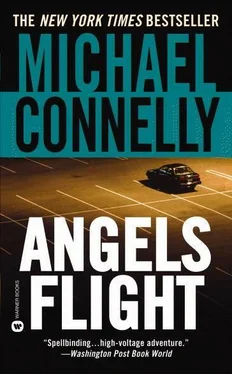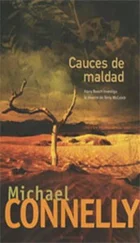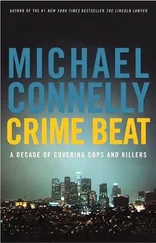“We are sitting on a powder keg here, people,” Irving said. “And the way to defuse it is to solve this case one way or the other… quickly.”
While he talked, Bosch took out the phone message pad and wrote on it. He then checked the room to make sure all eyes were on Irving and quietly tore off the top sheet. He reached over and tacked it to the bulletin board and then nonchalantly moved inch by inch down the wall and away from the board. The sheet he had put on the board had Chastain’s name on it. In the message section it said: “Harvey Button called, said thanks for the tip. Will call back later.”
Irving wound up his comments with a mention about the Channel 4 story.
“Someone in this room leaked information to a television reporter yesterday. I am warning you people that we will not have this. That one story was your grace period. One more leak and you people will be the ones under investigation.”
He looked around the room at the LAPD faces, to make sure the message was clear.
“Okay, that is it,” he finally said. “I will leave you to it. Detective Bosch, Agent Lindell? I would like to be briefed at noon on our progress.”
“No problem, Chief,” Lindell said before Bosch could respond. “I will be talking to you then.”
Fifteen minutes later Bosch was walking down the hallway to the elevators again. Edgar and Rider were following behind.
“Harry, where are we going?” Edgar asked.
“We’ll work out of Hollywood station.”
“What? Doing what? Who is going to run the show?”
“Lindell. I made a deal. He runs the show. We do something else.”
“Suits me,” Edgar said. “Too many agents and too much brass around here anyway.”
Bosch got to the elevators and pushed the call button.
“What exactly are we doing, Harry?” Rider asked.
He turned and looked at them.
“Starting over,” he said.
THE squad room was completely empty, which was unusual, even for a Sunday. Under the twelve-and-twelve readiness plan all detectives not assigned to time-critical investigations were to be in uniform and out on the street. The last time such deployment had been instituted was after a major earthquake had rocked the city in 1994. The Elias murder was a social rather than a geologic cataclysm, but its magnitude was just as great.
Bosch carried the box containing Elias’s files on the Black Warrior case to what they called the homicide table, a raft of desks pushed up against each other to create a huge boardroom-like table. The section that belonged to team one, Bosch’s team, was at the end, near an alcove of file cabinets. He put the box in the middle, where his team’s three desks conjoined.
“Dig in,” he said.
“Harry…,” Rider said, not happy with his lack of direction.
“Okay, listen, this is what I want. Kiz, you’re going to be master of the ship. Jerry and I will work the field.”
Rider groaned. Master of the ship meant that she was to be the keeper of the facts. She was to become familiar with all facets of the files, a walking compendium of the details of the investigation. Since they were starting off with an entire carton of files, this was a lot of work. It also meant she would not be doing much, if anything, in the way of field investigation. And no detective wants to be stuck in a windowless and empty office all day.
“I know,” Bosch said. “But I think you are best for it. We’ve got a ton of stuff here and your mind and your computer will be best for keeping track of it.”
“Next time I get the field.”
“There might not be a next time if we don’t do something this time. Let’s see what we got here.”
They spent the next ninety minutes going through Elias’s files on the Harris case, pointing out specific items to each other when they seemed to warrant attention, other times tossing files back into the box when their importance was not apparent.
Bosch spent his time with the investigative files that Elias had subpoenaed from the LAPD. He had a copy of the entire RHD murder book. Reading the daily investigative summaries turned in by Sheehan and other RHD detectives, Bosch noted that the case seemed initially to be lacking a focus. Stacey Kincaid had been taken from her room in the night, her abductor jimmying the lock on a bedroom window with a screwdriver and then grabbing the girl while she slept. Initially suspecting an inside job, the detectives interviewed the gardeners, the pool man, a local maintenance man, a plumber who had been in the house two weeks earlier, as well as the sanitation men and postal workers who had the route that included the Kincaids’ home in Brentwood. Teachers, janitors and even fellow students from Stacey’s private school in West Hollywood were interviewed. But the wide net being thrown by Sheehan and his cohorts was pulled in after the lab came up with the fingerprint match between the missing girl’s schoolbook and Michael Harris. The case then shifted to a complete focus on locating Harris, taking him into custody and then attempting to make him confess to what he had done with the girl.
The second section of the file also dealt with the crime scene investigation and efforts to connect Harris to the body through scientific analysis and technology. This proved to be a dead end. The girl’s body had been found by two homeless men in a vacant lot. The body was naked and badly decomposed after four days. It had apparently been washed after her death and therefore was lacking any significant microscopic evidence that could be analyzed and connected to Harris’s apartment or car. Though the girl appeared to have been raped, no bodily fluids belonging to her attacker were recovered. Her clothes were never found. The ligature that had been used to strangle her had been cut away by her killer and that, too, was never found. In the end, the only evidence that connected Harris to the crime was his fingerprints on the book in Stacey’s bedroom and the disposal of the body in the vacant lot less than two blocks from his apartment.
Bosch knew that was usually more than enough to win a conviction. He had worked cases in which convictions were won with less evidence. But that was before O.J. Simpson, before juries looked at police in Los Angeles with suspicious and judging eyes.
Bosch was writing a list of things to do and people to be interviewed when Edgar cried out.
“Yahtzee!”
Bosch and Rider looked at him and waited for an explanation.
“Remember the mystery notes?” Edgar said. “The second or third one said license plates prove he’s innocent?”
“Wait a second,” Bosch said.
He opened his briefcase and took out the file containing the notes.
“The third one. ‘License plates prove his innocence.’ Came in April five. Innocence spelled wrong.”
“Okay, here’s Elias’s file on subpoena returns. Got one here dated April fifteen for Hollywood Wax and Shine. That’s where Harris worked before they arrested him. It seeks – quote – ‘copies of all records and receipts of customer orders and billings containing license plate numbers of said customers between the dates of April one and June fifteen of last year.’ It’s gotta be what the note was talking about.”
Bosch leaned back in his chair to think about this.
“This is a subpoena return, right? It was approved.”
“Right.”
“Well, April one and June fifteen, that’s seventy-five days. There – ”
“Seventy-six days,” Rider corrected.
“Seventy-six days. That would be a lot of receipts. We got none here and there weren’t any in the office I saw. There should be boxes of receipts.”
“Maybe he returned them,” Edgar said.
“You said he subpoenaed copies.”
Читать дальше












